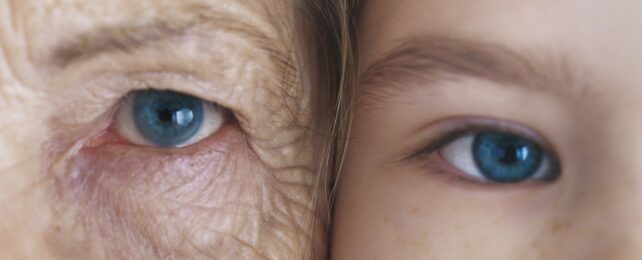They say you are what you eat, but in all likelihood, you are also what your mother ate and your grandmother ate before her.
A new study on animal pregnancy adds to mounting evidence that a mother's environment can impact her offspring's metabolism in the long run.
This intergenerational effect was first observed in 1909 among juvenile silk moths. The behavior of these moths during the winter season did not stem from specific inherited genes, but arose from how their bodies 'read' these genes or switched them 'on' or 'off'.
And this outcome was regulated by a mother's environment.
The potential for these 'epigenetic' changes have since been noticed in numerous other species of animal, including us, but how they cross intergenerational boundaries remains uncertain.
Researchers at Monash University in Australia have now found evidence of female roundworms (Caenorhabditis elegans) endowing their children and grandchildren with extra brain protection that when they eat certain types of food.
The study was not done on humans, but because C. elegans shares many genes with our own species, it provides some interesting insights into how epigenetic changes might work across the natural world.
If germ cells, like eggs or sperm, are somehow changed by a mother's diet whilst in utero, studies show it can stick with the offspring for better or worse.
When scientists fed roundworm larvae a molecule commonly found in apples and herbs, called ursolic acid, they noticed that the offspring were somewhat protected from a natural breakdown in neural communication.
Specifically, ursolic acid seems to 'switch on' a gene in the worms, which makes a specific type of fat, sphingosine-1-phosphate, known as a sphingolipid. This fat prevents the axons of neurons in the brain from weakening, and initial results suggest the fat can travel from the intestines of mother worms to the eggs in her uterus.
In worm offspring, researchers found that increased levels of the specific sphingolipids drove significant metabolic changes, and these were maintained throughout development and for another additional generation.
"This is the first time that a lipid/fat has been shown to be inherited," says biomedical researcher Roger Pocock from Monash.
"Further, feeding the mother the sphingolipid protects the axons of two subsequent generations. This means a mother's diet can affect not just their offspring's brain but potentially subsequent generations. Our work supports a healthy diet during pregnancy for optimal brain development and health."
A review of the paper by US epigeneticist Nicholas Burton in Nature provides some important context.
C. elegans is an oviparous animal, Burton explains, meaning its eggs hatch after they've been laid. It's not clear if the results of the current study extend to viviparous animals, like mammals, that birth live young.
However, Burton notes, epidemiological studies in humans do show that low birth weight, sometimes as a result of nutritional deficiencies during pregnancy, can increase an offspring's risk of later developing metabolic issues, such as cardiovascular disease and type 2 diabetes.
Burton hopes "studies of model organisms like C. elegans might pave the way for many new discoveries about how and why animals link maternal and offspring metabolism."
The study was published in Nature Cell Biology.
